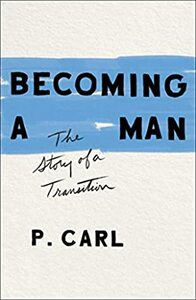Take a photo of a barcode or cover
Some chapters (especially the one about hiking in Italy) struck me more than others, but I really enjoyed Carl's meditations on the differences between being a man and a woman, and his insight in inhabiting (and loving) male spaces, having previously been on the other side. I really loved his insights on masculinity, and this is more of meditation than memoir (more essays than personal history/journey). I also really enjoyed his narration of the audiobook.
4.5 stars.
4.5 stars.
- i empathized with alot of the feelings, but do not agree with some of the opinions that he expresses
- the sections could have been better ordered, i felt like the book oscillated between moving towards a more nuanced understanding of masculinity and then immediately regressed
- not to sound pretentious but i like purple prose and nice sentences, and that is often why i hate memoirs bc the writing is tedious to read
- kind of repetitive and really depressing
- incredibly self-aware but also frustrating, i wish he had pushed into the self awareness more
- like he talks alot abt doubling and multiple faces, but he never actually gets into the how/what of it, he just keeps talking about the the why over and over again
- i felt like i understood it bc i have those same feelings and am surrounded by people with those feelings, i wouldn't be able to and don't trust cis people to be able to extrapolate what he has said into their own lived experience / take it with nuance
- powerful emotionally
- the sections could have been better ordered, i felt like the book oscillated between moving towards a more nuanced understanding of masculinity and then immediately regressed
- not to sound pretentious but i like purple prose and nice sentences, and that is often why i hate memoirs bc the writing is tedious to read
- kind of repetitive and really depressing
- incredibly self-aware but also frustrating, i wish he had pushed into the self awareness more
- like he talks alot abt doubling and multiple faces, but he never actually gets into the how/what of it, he just keeps talking about the the why over and over again
- i felt like i understood it bc i have those same feelings and am surrounded by people with those feelings, i wouldn't be able to and don't trust cis people to be able to extrapolate what he has said into their own lived experience / take it with nuance
- powerful emotionally
We need more voices like P. Carl in the world. People who really understand, not from an armchair, but from harsh experience, the reality of how women's bodies are commodified, used, and abused from both the male and female perspective. This book opened my eyes to new jagged twists to the cruel existential crises faced by trans folk; their truly "doubled" lives and the mental pretzels they have to tie themselves into in their minds just to take another breath in our society. This book is not for TERFs. If they aren't convinced by now that being trans is real, this book will not change that. It will only solidify their cognitive dissonance by asserting that the male gender identity indeed does have more freedom, power, and respect in society. TERFs will read it as proof that female to male transition is a betrayal by women willing to "cheat the system" in order to get access to that power. But the empathic, scientific minded person will read this as more proof that life is far less organized and certain than that, with sex and gender identity both being on a spectrum while remaining separate, but intertwined, realities.
This was one of the more complex and well-written trans memoirs that I've read, and I have found myself reflecting back on it several times throughout reading it. Having transitioned later in life, P. Carl does a good job of explaining the ways in which he was always a man, and the ways in which he lived and was perceived a woman for most of his life. He approaches gender as binary, though acknowledges that that is not everyone's truth. He resists a queer identity, which was very interesting to read about, and which you won't begrudge, as he explains himself thoughtfully and honestly, in a manner which doesn't evade the complexity of his beliefs and truths. I admit that when he spoke about his anger at the ways in which his story has become his wife's, I had already been wondering what his wife's experience was, and had to interrogate the reasons why. It was a good reminder for me, and one which made me consider the reasons behind that shift in alliance, even as he explained and defended it himself. I hope more people read this, so I can continue to discuss and process all that this account has offered.
reflective
slow-paced
reflective
medium-paced
informative
reflective
medium-paced
"The entire architecture of our culture is founded on gender- our economy, our rituals, our desires, and our love- even when we queer those rituals or reimagine them, we are still investing in gender and what we think it looks like on the outside."
Not quite what I was anticipating, but a rather poetic and eye-opening view of what it's like to transition later in life. Full review:
https://sarahsreads.home.blog/2020/01/08/becoming-a-man-the-story-of-a-transition-by-p-carl/
https://sarahsreads.home.blog/2020/01/08/becoming-a-man-the-story-of-a-transition-by-p-carl/
Ooof I have a lot of mixed feelings about this book. In some ways it’s a raw and painfully truthful account of someone finally feeling their body as theirs and how they got to that point. But I can’t ignore throughout the book that Carl’s internal misogyny isn’t challenged, rather it becomes external misogyny and he ends up celebrating that. He’s says he hopes white toxic masculinity is nearing its end whilst simultaneously sharing anecdotes where he happily contributed to white toxic masculinity so he could feel “like a man”. I just wish him the best and hope his growth continues to a point where he addresses this.




